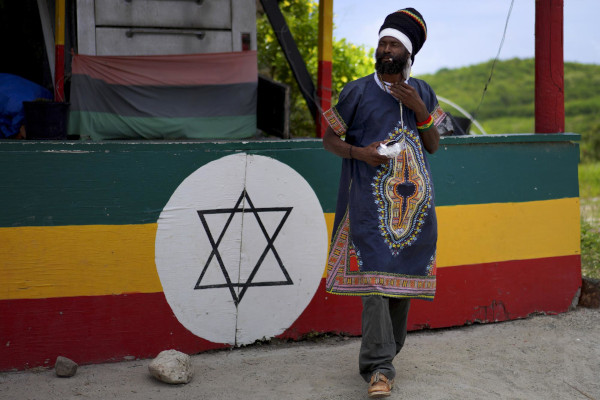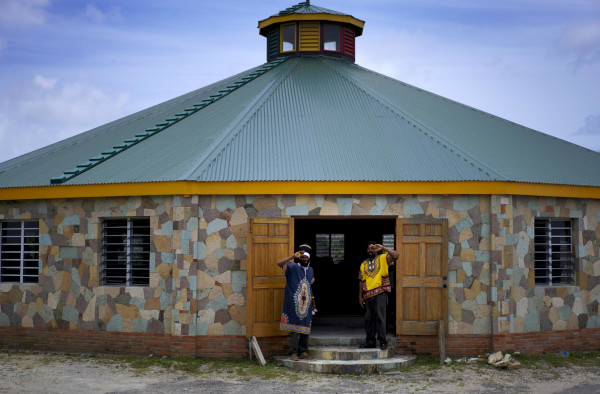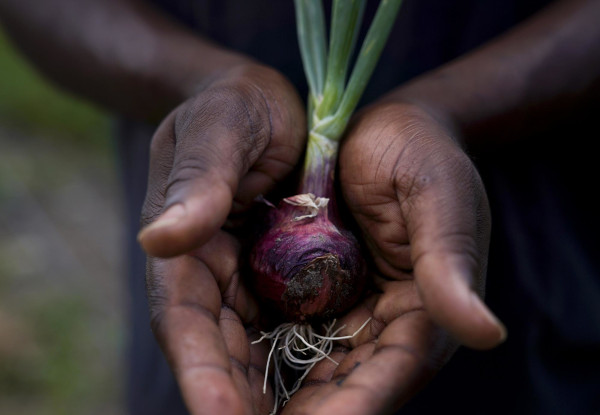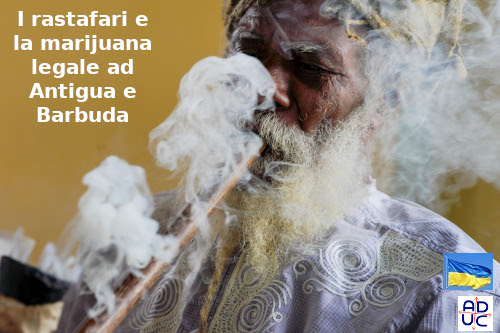For Rastafari, the practice brings them closer to the divine. But for decades, many have been incarcerated and faced racial and religious harassment by law enforcement because of their marijuana use.
The government of Antigua and Barbuda has tried to right this wrong. The twin islands recently became one of the first Caribbean nations to grant Rastafaris permission to grow and smoke their sacramental weed.
“We are freer now,” said Ras Tashi, a member of the Ras Freeman Foundation for the Unification of Rastafari, who has been arrested several times for growing cannabis but refused to plead guilty because for him “it’s a plant donated by God.”
On a recent Sunday, he led songs and praises in the tabernacle of the foundation farm located in the leafy agricultural district of Liberta. Tashi snorted on a joint wrapped in corn husks as others passed goblets and waved Rastafari flags in the green, gold and red colors of the faith.
“The government gives us our religious rights…we can come and plant any amount of marijuana…and no police can come and take a plant. We fight for this right and we get it right,” she said. Rastafari elsewhere are pushing for similar religious protections. Experts and stakeholders believe the Antigua and Barbuda law could give a boost to these efforts around the world at a time when public opinion and politics continue to shift in favor of medical and recreational marijuana use.
Rastafari elsewhere are pushing for similar religious protections. Experts and stakeholders believe the Antigua and Barbuda law could give a boost to these efforts around the world at a time when public opinion and politics continue to shift in favor of medical and recreational marijuana use.
With the same law change, the island government also decriminalized the use of marijuana for the general public. In addition to the extensive religious use granted to Rastafari, people outside the faith can grow four cannabis plants each and possess up to 15 grams.
“We believe we need to provide space for everyone at the table, regardless of their religion,” Prime Minister Gaston Browne told The Associated Press in an interview at his office in the capital St. John’s.
“Just as we have recognized other faiths, it is absolutely important for us to ensure that the Rastafari faith is also recognized… to recognize their constitutional right to worship and use cannabis as a sacrament.”
“Ganja,” as marijuana is also known, has a long history in the Caribbean region and its arrival predates the Rastafari faith. Indentured servants from India brought the cannabis plant to Jamaica in the 19th century, and it became popular as a medicinal herb.
It began to gain wider acceptance in the 1970s, when Rastafari and reggae culture was popularized through music icons Bob Marley and Peter Tosh, two of the religion’s most famous exponents. Rastafari reject materialistic values and often practice close unity with nature, eating only unprocessed foods as part of their faith’s vegetarian “Ital” diet. They also let their hair grow, unkempt, into dreadlocks.
Rastafari reject materialistic values and often practice close unity with nature, eating only unprocessed foods as part of their faith’s vegetarian “Ital” diet. They also let their hair grow, unkempt, into dreadlocks.
But many of them have long been treated as second-class citizens in the Caribbean islands, scorned for their fears and sacramental use of marijuana.
The prime minister said growing up poor in Antigua, he witnessed how Rastafari were chased by police and jailed, while children weren’t allowed in schools because of their hair. Browne also recalled how members of Rastafari generously fed him “Ital” meals when his single mother, who had mental illness, struggled to raise him and her siblings.
“They embraced me,” she said in her office overlooking palm trees, green hills and the turquoise waters of the Caribbean. “Talk about that positive value of brotherly love … I’ve always been socialized to embrace Rastafari.” After Browne took office in 2014, he appointed Ras Frank-I, the late and respected Rastafari leader, as ambassador to Ethiopia. In 2018, Browne publicly apologized to the Rastafari community for the religious oppression and persecution they suffered. He also said that Rastafari should be awarded a stake in the production and economic benefits derived from medicinal marijuana as reparation “for the wrongs inflicted on this significant minority group in our countries.”
After Browne took office in 2014, he appointed Ras Frank-I, the late and respected Rastafari leader, as ambassador to Ethiopia. In 2018, Browne publicly apologized to the Rastafari community for the religious oppression and persecution they suffered. He also said that Rastafari should be awarded a stake in the production and economic benefits derived from medicinal marijuana as reparation “for the wrongs inflicted on this significant minority group in our countries.”
His government also helped build a public school run by Rastafaris and spearheaded efforts to decriminalize marijuana use.
Earlier this year, he met with Rastafari groups and granted them licenses from the National Medical Cannabis Authority to grow the plant for religious purposes.
“We have adopted many European and non-European religions and we have a pan-African religion… and instead of embracing it, we have tried to destroy it,” Browne told Rastafari members in March. “I want to encourage you to stand your ground (and) continue to exercise that resilience.”
The changes have met with some opposition from some Christian politicians and leaders in the socially conservative Caribbean region. But Rastafari academics have praised Browne’s apology and the actions of his government, saying this small nation of about 100,000 people has gone beyond the regional efforts of larger countries and could set a global example.
Jamaica and more recently the US Virgin Islands have granted sacramental rights to cannabis. But Charles Price, a professor at Temple University in Philadelphia who studies Rastafari identity, said it was Antigua and Barbuda’s global initiative that could spur more organizing for the sacramental recognition of cannabis in other islands.
They have become “pilot cases for the rest of the Caribbean,” he said. “They will suggest the feasibility of this…so other nations can now look at these two nations and say, ‘Ah, they did it.'”
Thanks to a government lease, a former sugar cane plantation – a symbol of slavery and British colonial oppression – in Antigua has been transformed into places of worship, sustainable farmland and the headquarters of Ras Freeman, one of the main Rastafari groups on the island.
“This may be a small victory, but it is something we can definitely celebrate and feel proud of: those lands that were once used to enslave our people, we are using them to liberate our community,” said Ras Richie, a group member. He is also a co-founder of Humble and Free Wadadli, during that recent Sunday worship service, with the breeze blowing verdant leaves over the marijuana fields surrounding the gray stone remains of a sugar mill.
Inside the nearby tabernacle, clouds of marijuana-scented smoke drifted in the air as members of Ras Freeman sang psalms, “howled” and beat Nyabinghi drums.
“Attitudes towards cannabis have changed dramatically and are more in a positive light,” said Ras Kiyode Erasto, president of Ras Freeman outside the tabernacle, as he grabbed branches of dried cannabis.
“We give thanks to the prime minister…his government has moved boldly to decriminalize and even grant sacramental rights to the Rastafari community.”
Erasto said he suffered from constant bullying and discrimination. At one point, he said, his mother had to cut off his dreadlocks so he could be admitted to school.
“It was sad,” she recalled. “I loved my locks as a kid.”
Rastafari dreadlocks are an “antenna to the cosmos” to connect with “the planets, the sun, the moon…it’s the broadcast receiver to messages out there that come to us in a spiritual sense,” said Erasto, who now she has long gray and white hair, flowing locks.
Throughout his adulthood, he joined marches demanding fair treatment for his community and traveled to other islands for conferences led by the Caribbean Rastafari Organization to advocate for the sacramental right to cannabis.
“We see marijuana as a medicine, a food source. We see it as a sacrament. … It helps us in meditation and to tap into consciousness,” she said. “Depriving ourselves of our food, of our medicine, we considered it unfair. … We’ve had to stand up and fight through the years.
Erasto was part of a group of Rastafari from all over the Caribbean to help repeal the so-called “Rasta Law” in the British Virgin Islands. The 1980 law ordered immigration authorities to refuse entry to the territory to non-resident Rastafaris and “hippies”. It has remained in the codes for more than 20 years.
“You go through a lot of struggles, especially with cannabis,” said Shakie Straker, mother of Erastus and matriarch of the group, after hours of singing and praising during Sunday worship. “One pays a lot of money, fines to the court. The man goes to prison. The man also loses his life. And that’s the fight, but (now) it’s 100% better.” To cleanse the land, the group always keeps the red embers of a Nyabinghi fire burning near their house of worship. They cook together and share meals of coconuts, cassava, carrots and onions grown on their own pesticide-free land. They maintain a strong social media presence with photos and videos introducing visitors to their culture and faith. And they plan to expand, eventually hoping to build a museum, a shop to sell their Italian food, and a cannabis sacrament dispensary.
To cleanse the land, the group always keeps the red embers of a Nyabinghi fire burning near their house of worship. They cook together and share meals of coconuts, cassava, carrots and onions grown on their own pesticide-free land. They maintain a strong social media presence with photos and videos introducing visitors to their culture and faith. And they plan to expand, eventually hoping to build a museum, a shop to sell their Italian food, and a cannabis sacrament dispensary.
(Luis Andres Heano, Associated Press of 06/01/2023)
the association does not receives and is against public funding (also 5 per thousand)
Its economic strength are inscriptions and contributions donated by those who deem it useful
DONATE NOW
